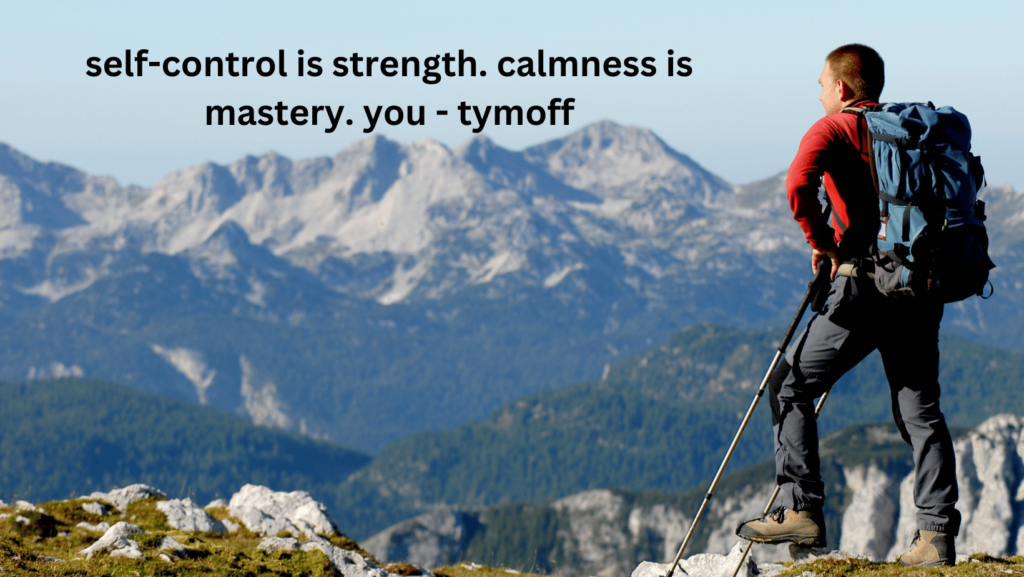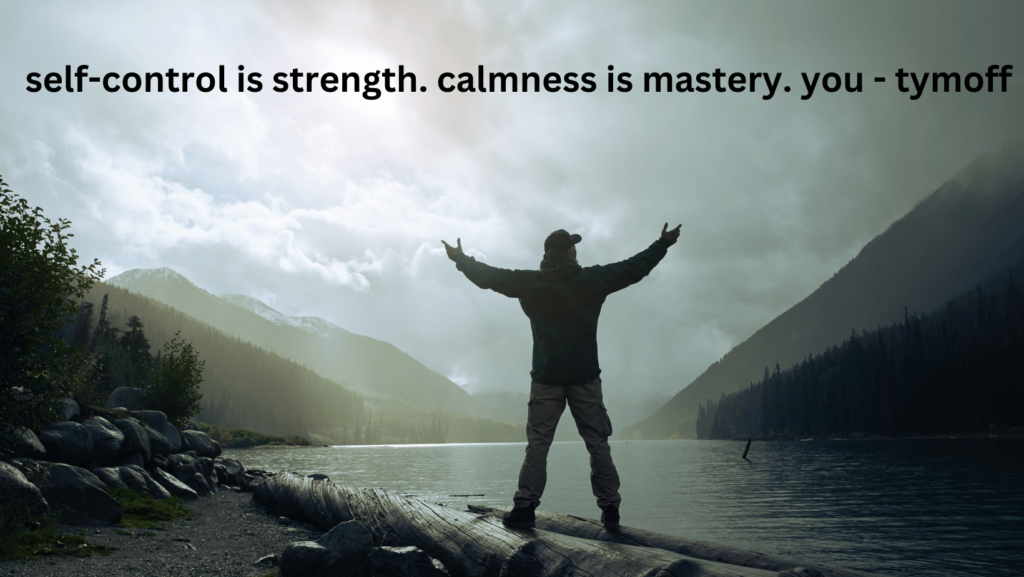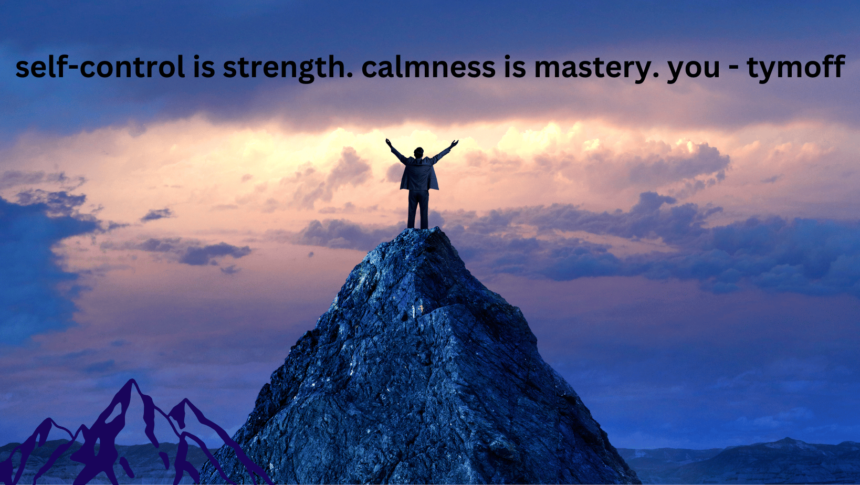In our fast-paced world, where distractions are plentiful and patience is often in short supply, the concepts of self-control and calmness have never been more relevant. These attributes, often overshadowed by the allure of instant gratification and quick fixes, are fundamental to achieving personal and professional success. The phrase “self-control is strength. calmness is mastery. you – tymoff” encapsulates this philosophy succinctly. This article delves into the profound significance of self-control and calmness, exploring how these virtues can be harnessed to improve various aspects of life.
The Essence of Self-Control
Self-control, often defined as the ability to regulate one’s emotions, thoughts, and behaviors in the face of temptations and impulses, is a cornerstone of personal development. It is the strength that allows individuals to make rational decisions and pursue long-term goals, even when immediate desires are tempting. Self-control is not merely about resisting temptations; it is about understanding oneself deeply and aligning actions with values and goals.
Research has consistently shown that self-control is linked to numerous positive outcomes, including better mental and physical health, higher academic and professional achievement, and improved interpersonal relationships. For instance, the famous “Marshmallow Test” conducted by psychologist Walter Mischel demonstrated that children who exhibited greater self-control by delaying gratification tended to have better life outcomes in adulthood. This study underscores the lasting impact of self-control on an individual’s trajectory.

Self-control also plays a crucial role in managing stress and adversity. Life is replete with challenges and uncertainties, and the ability to remain composed and focused under pressure can make a significant difference. Individuals with high self-control are better equipped to navigate difficult situations without succumbing to negative emotions or impulsive reactions. This resilience enables them to maintain a positive outlook and continue striving towards their goals, regardless of external circumstances.
The Power of Calmness
Calmness, on the other hand, is often perceived as a passive state, but it is far from it. True calmness is an active process of maintaining inner peace and composure, even in the midst of chaos. It is the mastery over one’s emotional responses, allowing for thoughtful and deliberate action rather than knee-jerk reactions. Calmness is a form of emotional intelligence that involves recognizing and managing one’s emotions and understanding the emotions of others.
The benefits of calmness are manifold. Firstly, it enhances decision-making. When the mind is calm, it is more capable of processing information clearly and making sound judgments. This clarity of thought is particularly valuable in high-stress environments where quick and effective decision-making is essential. Calmness also fosters creativity and problem-solving skills, as a relaxed mind is more open to new ideas and perspectives.
Furthermore, calmness has a profound impact on physical health. Chronic stress and anxiety are known to contribute to a myriad of health issues, including cardiovascular diseases, weakened immune system, and mental health disorders. By cultivating calmness, individuals can reduce their stress levels, thereby improving their overall well-being. Practices such as mindfulness meditation, deep breathing exercises, and yoga are effective in promoting a state of calm and have been shown to reduce symptoms of stress and anxiety.
Integrating Self-Control and Calmness
While self-control and calmness are powerful individually, their combination is particularly potent. Together, they create a balanced approach to life’s challenges, enabling individuals to act with intention and clarity. Integrating these virtues into daily life requires practice and mindfulness, but the rewards are substantial.
One effective strategy is to develop a daily routine that incorporates activities designed to enhance self-control and calmness. For instance, setting aside time each day for mindfulness meditation can help cultivate a state of calm and improve emotional regulation. Regular physical exercise is another excellent way to build self-control, as it requires discipline and perseverance while also reducing stress.
Another important aspect is to cultivate self-awareness. Understanding one’s triggers and patterns of behavior is essential for exercising self-control and maintaining calmness. Keeping a journal can be a valuable tool in this regard, as it allows for reflection on daily experiences and emotions. By identifying situations that typically provoke impulsive reactions or stress, individuals can develop strategies to manage these challenges more effectively.
Practical Applications in Personal and Professional Life
The principles of self-control and calmness are not just theoretical concepts; they have practical applications in various domains of life. In personal relationships, for instance, these virtues can improve communication and conflict resolution. By exercising self-control, individuals can avoid saying things in the heat of the moment that they might later regret. Calmness, meanwhile, allows for more empathetic and constructive conversations, fostering stronger and more harmonious relationships.
In the professional realm, self-control and calmness are equally invaluable. Leaders who embody these qualities are better equipped to inspire and motivate their teams, handle crises with poise, and make strategic decisions. Employees with high self-control and calmness are more productive, as they can manage their time effectively, stay focused on tasks, and navigate workplace stress with ease.
For students, developing self-control and calmness can enhance academic performance. The ability to concentrate on studies, resist distractions, and approach exams with a calm mind can significantly impact learning outcomes. Educational institutions can play a role in fostering these skills by incorporating mindfulness and self-regulation techniques into their curricula.

Overcoming Challenges
Despite the clear benefits, developing self-control and calmness can be challenging. It requires consistent effort and may involve overcoming deeply ingrained habits and thought patterns. One common obstacle is the immediate gratification bias, where individuals prioritize short-term rewards over long-term goals. Overcoming this bias involves shifting one’s mindset to value future benefits and practicing delay of gratification.
Another challenge is managing external stressors. Life’s unpredictability means that stressors will inevitably arise, and maintaining calmness in the face of such challenges can be difficult. Building a robust support system, engaging in regular self-care practices, and seeking professional help when needed are crucial steps in managing stress and maintaining emotional equilibrium.
Conclusion: The Path to Mastery
The adage “self-control is strength. calmness is mastery. you – tymoff” serves as a powerful reminder of the virtues that can lead to a more fulfilling and successful life. Self-control provides the strength to pursue meaningful goals and resist distractions, while calmness offers the mastery to navigate life’s inevitable ups and downs with grace and composure. Together, these qualities empower individuals to live with intention and resilience.








